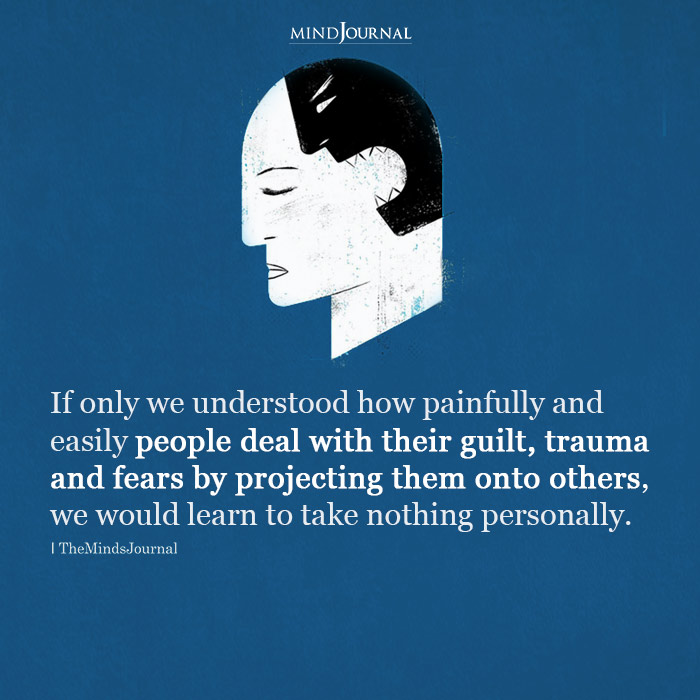Do you feel guilty about everything, even things that you didn’t do? If so, you may have a guilt complex. Let’s find out what is a guilt complex, what causes a guilt complex and how to overcome guilt complex.
The heavy baggage of guilt
Guilt is a normal human emotion that we all experience from time to time. Sometimes for good reason and other times not. But for many, guilt becomes an all-consuming feeling that they carry with them constantly. In such cases, guilt can become a chronic problem that can interfere with their everyday lives. This is known as a guilt complex.
This guilt complex can keep people in emotional turmoil and torment, causing anxiety, depression and hindering their ability to live a happy and fulfilling life.

What is a guilt complex?
A guilt complex is a psychological condition where an individual experiences persistent and excessive guilt, even when there’s no rational reason for it. People with a guilt complex feel guilty about everything, including things they didn’t do wrong, or things that are beyond their control.
They may constantly apologize for themselves, even when they don’t need to. They may also be very critical of themselves, and they may have a hard time forgiving themselves for their mistakes.
Such excessive or irrational feelings of guilt often become complex and ingrained in one’s personality. Sufferers may feel guilty over minor issues or things beyond their control. Their sense of guilt is distorted and often disproportionate to the situation.
Such extreme feelings of guilt can stem from:
- Making mistakes
- Minor transgressions
- Past actions, even if trivial
- Decisions that negatively impact others, even unintentionally
- The inability to live up to an ideal or standard
For them, the guilt becomes confusing, unrelenting and overwhelming. They blame and criticize themselves harshly rather than learn from experiences and move forward.
This experience can be debilitating, leading to feelings of worthlessness, low self-esteem, and depression. It can affect all aspects of a person’s life, including their relationships, work, and overall well-being.
Related: Unhealthy Guilt Syndrome: How It Affects Your Mental Health And Relationships
Guilt complex symptoms
To better understand what is a guilt complex, we need to learn how to identify its symptoms. Here are some common guilt complex symptoms that can affect an individual’s mental and emotional well-being:
1. Constantly apologizing
People with a guilt complex apologize for everything, even when there’s no reason to apologize.
2. Difficulty making decisions
They may find it challenging to make decisions because they’re afraid of making the wrong choice.
3. Low self-esteem
A guilt complex can lead to low self-esteem, as individuals may feel like they’re not good enough or that they don’t deserve happiness. This is one of the primary guilt complex symptoms.
4. Avoidance
They may avoid situations or people that trigger their guilt, leading to social isolation and withdrawal.
5. Excessive self-blame
They often blame themselves excessively for everything that goes wrong, even if it’s not their fault.
6. Perfectionism
They may feel that they need to be perfect in all aspects of their lives, leading to feelings of guilt when they fall short of their own expectations.
7. Anxiety
Guilt can be a significant source of anxiety, leading to worry and stress about past actions or future consequences.
8. Difficulty accepting compliments
People with a guilt complex may struggle to accept compliments or praise, as they don’t feel worthy of it.
9. Depression
It can contribute to feelings of sadness, hopelessness, and despair, leading to depression.
10. Physical symptoms
Guilt can manifest as physical symptoms, such as headaches, fatigue, or digestive problems.
11. People-pleasing behavior
They may feel the need to please others at all costs, leading to feelings of guilt when they can’t meet others’ expectations.
12. Rumination
Individuals with this condition may ruminate on past mistakes, replaying them in their minds, and feeling guilty repeatedly.
Some other common guilt complex symptoms may include –
- Constantly feeling guilty, even when there’s little reason for it
- Taking responsibility for others’ feelings or circumstances
- Feeling undeserving of praise, success or happiness
- Fear of making mistakes and constantly seeking perfection
- Trouble letting go of guilt even after apologizing
What causes a guilt complex
There are several reasons why someone may develop a guilt complex. Here are some common causes:
1. Childhood experiences
Childhood experiences can shape our beliefs, values, and attitudes towards ourselves and others. Hence, environment and upbringing plays a major role in developing a guilt complex.
Stringent parenting or an overly critical environment during childhood instills feelings of inadequacy and a fear of failure. If a child was raised in an environment where they were constantly criticized, punished, or made to feel guilty, they may internalize these feelings and develop a guilt complex later in life.
People with a guilt complex were often:
- Raised in families with rigid rules and high expectations
- Criticized harshly for mistakes as children
- Raised to believe they are responsible for others’ happiness
- Exposed to trauma or abuse at an early age
- Taught to suppress emotions rather than process and release them healthily
As adults, they carry these harmful beliefs with them, beating themselves up for any perceived fault or shortcoming. This is what causes a guilt complex.
2. Traumatic events
Traumatic events, such as abuse, neglect, or loss, can also lead to a guilt complex. People who have experienced trauma may feel guilty for surviving, for not being able to prevent the event, or for feeling like they could have done more.
3. Perfectionism
When someone is a perfectionist, they may be constantly setting unreasonable and impractical standards for themselves. When they inevitably fall short, they may feel overwhelming guilt.
Related: How to Relieve the Burden of Survivor’s Guilt
4. Unrealistic expectations
People who set unrealistic expectations for themselves may also develop a guilt complex. When they don’t meet their own expectations, they feel guilty, even if they’ve done nothing wrong.
5. Cultural and religious beliefs
Some cultural and religious beliefs can also promote feelings of guilt. For example, in some cultures, it’s considered selfish to prioritize one’s own needs over the needs of the group, which can lead to guilt when someone tries to take care of themselves.
6. Low self-esteem
If someone has low self-esteem, they may be more likely to blame themselves for things that go wrong. This can lead to a cycle of negative thinking and self-blame.
Now that we know what is a guilt complex and what causes a guilt complex, let’s find out how we can practically deal with it.

How to overcome guilt complex
Here are some practical tips that can help you manage and learn how to overcome guilt complex:
1. Identify the source of your guilt
Try to identify the source of your guilt. Is it something you did wrong, or is it an irrational feeling? Understanding the root cause of your guilt can help you address it more effectively.
2. Acknowledge your feelings
Accept that you feel guilt disproportionately. Repressing your emotions only makes them more troublesome.
3. Separate facts from feelings
Examine the situation rationally. Determine if your feelings match the facts of what occurred. If not, recognize your emotions may be distorted.
4. Challenge your thoughts
When you’re feeling guilty, challenge your thoughts by asking yourself if they’re rational. Are you assuming responsibility for something that’s beyond your control? Are you being too hard on yourself?
5. Avoid self-criticism
Be kind to yourself and practice self-compassion. Treat yourself like you would treat a friend who’s struggling with guilt or going through a difficult time. This is how to overcome guilt complex.
6. Set healthy boundaries
Establish practical boundaries to protect your mental and emotional well-being. Remember you’re not responsible for other people’s feelings. Only they can control their own emotions.
7. Process your emotions
Write in a journal, talk to a friend, meditate or reflect. Find healthy outlets for processing and releasing negative emotions.
8. Focus on the present
Reframe guilt as a lesson learned. Use it as motivation to make better choices now. Focus on how you can grow from here by practicing mindfulness.
9. Learn to forgive Yourself
Guilt serves a purpose when it motivates positive change. But once you’ve learned from a mistake, forgive yourself for any mistakes you’ve made and focus on moving forward. Forgiveness is a powerful tool that can help you let go of guilt.
10. Seek support
Don’t be afraid to seek support from trusted friends, family, or a loved one. Talking to someone can help you gain a new perspective on your situation and find healthy ways to cope.
Related: Breakup Guilt: How To Get Over Breakup Anxiety And Move On?
11. Talk to a therapist
A therapist can help you understand the root of your guilt and develop coping mechanisms to help you manage it. This is how to overcome guilt complex.
12. Set realistic expectations for yourself
Don’t expect yourself to be perfect. Everyone makes mistakes.
13. Focus on your strengths
Instead of dwelling on your mistakes, focus on your strengths and accomplishments.
14. Let go of the past
The past is the past. There’s nothing you can do to change it, so it’s important to let it go and focus on the present.
15. Don’t isolate yourself
Spend time with people who support you and make you feel good about yourself.
People who are positive and supportive can help you to overcome your guilt complex. They can remind you of your strengths and help you to see the good in yourself.
16. Be grateful
Make a list of things you’re grateful for every day. This will help you to focus on the positive aspects of your life and reduce your feelings of guilt.
17. Volunteer and help others
Volunteer your time to help others in need. This will help you to feel good about yourself and make a difference in the world.
18. Take care of yourself
Make sure you are getting enough sleep, eating healthy foods, and exercising regularly. These things will help you to feel better physically and emotionally, which can make it easier to deal with your guilt complex.
Takeaway
A guilt complex can be overwhelming and debilitating, but it’s not something you have to live with forever.
By identifying the source of your guilt, challenging your thoughts, practicing self-compassion, forgiving yourself, and seeking support, you can overcome your guilt complex and live a more fulfilling life.
Remember that guilt is a normal human emotion, but it doesn’t have to control your life. You have the power to take control of your thoughts and emotions and live a life free from excessive guilt.
Related: 7 Guilty Thoughts That Keep You With Someone Who Doesn’t Deserve You
Frequently Asked Questions (FAQs):
What is an example of guilt complex?
An example of a guilt complex is feeling guilty for everything, including things that are beyond one’s control or not one’s fault.
Is guilt complex a disorder?
Guilt complex is not recognized as a formal mental health disorder but can be a symptom of anxiety, depression, or other mental health conditions.
What is the psychology behind guilt?
Guilt is a complex emotion that arises from a person’s sense of responsibility for a perceived wrongdoing or failure to meet expectations.









Leave a Reply
You must be logged in to post a comment.